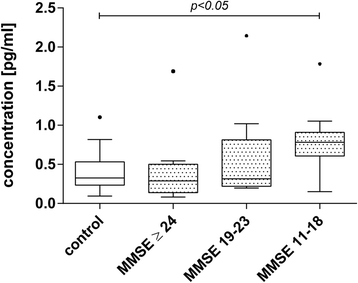Decreased IL-8 levels in CSF and serum of AD patients and negative correlation of MMSE and IL-1β
- PMID: 27671345
- PMCID: PMC5037590
- DOI: 10.1186/s12883-016-0707-z
Decreased IL-8 levels in CSF and serum of AD patients and negative correlation of MMSE and IL-1β
Abstract
Background: It is widely accepted that neuroinflammatory processes play an important role in the pathogenesis of Alzheimer's disease (AD) and high levels of cytokines and chemokines are detected around Aβ plaques.
Methods: As neuroinflammation is involved in the development and progression of AD, we measured the pro-inflammatory cytokines interleukin 1β (IL-1β), IL-8 and tumor necrosis factor α (TNF-α) in serum and cerebrospinal fluid (CSF) samples from 45 AD patients and 53 age-matched control subjects using a highly sensitive multiplex electrochemiluminescence assay. To address the association with disease progression we correlated cognitive status with cytokine levels.
Results: CSF as well as serum IL-8 levels were found to be significantly lower in AD patients than in controls (p = 0.02). A statistically significant inverse correlation was observed between the CSF level of IL-1β and the MMSE score (rs = -0.03, p = 0.02). We therefore stratified the AD patients by their MMSE scores into three equal groups and found that in the AD group with the most severe cognitive impairment CSF-IL-1β was significantly increased compared to age-matched controls (p < 0.05), whereas in the other investigated groups the increase was not statistically significant.
Conclusion: Our results confirm data suggesting that cytokine alterations are involved in AD pathogenesis and may be helpful as a biomarker for monitoring disease progression.
Keywords: Alzheimer’s disease; Cytokines; Neuroinflammation.
Figures



References
-
- Selkoe DJ. Alzheimer's disease: genes, proteins, and therapy. Physiol Rev. 2001;81(2):741–766. - PubMed
LinkOut - more resources
Full Text Sources
Other Literature Sources
Research Materials

